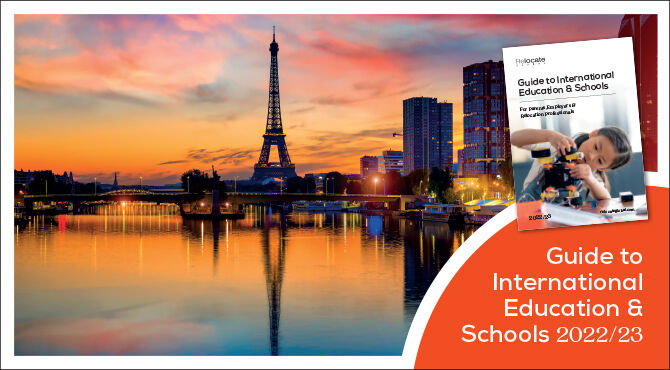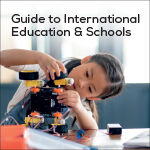Education in France
Families relocating to France will find a wealth of education options, from state-funded schools and bilingual schools to fee-paying private and international schools, each with its own advantages.
Bilingual schools
At senior level, France’s highly academic bilingual state-funded schools are popular with expats. These have ‘sections interantionale’ which aim to integrate foreign students into the French system. Seventeen languages and cultures are represented including British, Dutch, American, Arabic and German. These schools follow the French national curriculum but with some additional subjects taught in the student’s native language (usually history, geography and language and literature). Students work towards the Baccalaureate Francais International (BFI), an academically demanding international version of the French bac. Fees are low (around EUR5000 in senior years) and only apply to the non-French part of the curriculum.The most popular of these bilingual schools is the Lycee International Saint Germain-en-Laye in Paris, which consistently ranks among France’s top schools and caters for students with international backgrounds. Students must be fluent in one of the languages taught in the school’s 14 international sections which include British, American, Italian, Spanish and Russian. Lessons are in French with courses in language lit, history and geography taught in the student’s own language to supplement the French curriculum.The Ecole Jeanine Manuel is a popular not-for-profit French bilingual school with campuses in Paris and Lille. Fees are less expensive than private international schools and academic standards are high. Like the Lycee International, there is huge competition for places and students need good language skills to access the French curriculum.“More families are trying to register their children in these subsidised international schools as fewer companies are offering packages that include school fees,” says Odile Calla-Simon of Paris-based Sofime Relocation.International schools
The simplest option for globally-mobile families is often the private international school system where lessons are taught in English. There are over 100 private international schools in France with most in Paris but Lyon, Marseilles, Toulouse, Montpelier, Bordeaux, Nantes and Lille also have private international options.Traditionally these schools have only attracted expats but this is changing. “More locals are seeking an international education for the English language skills, international mindedness, SEN provision and pastoral care,” says Nalini Cook, head of global research at ISC Research.Class sizes are smaller than in the French state system, facilities better and there is greater access to extra curricula activities. Students can also study for exams recognised in their home country such as IGCSE, A levels, the American Diploma or for the internationally recognised IB. Fees vary but expect to pay up to EUR40,000 for senior years in the most popular schools."We chose the private over the state system for number of reasons," says Jane Bruce whose twins attended the British School. "It had better facilities and extra curricula activities and a more nurturing approach. The French system has a reputation for being tough which would not have suited our daughters. We also liked the fact the curriculum included traditional events such as Christmas concerts which the French system did not."The private international schools in Paris include some of the most exclusive in Europe. All are co-ed and most are clustered in the western suburbs. The most popular curriculums are French, British and the IB, although there are many others on offer including American, German and Canadian. Private international schools are not subsidised by the government, or inspected by them, so it is wise to choose one which belongs to the Council of British International Schools (CBS) or the Council International Schools (CIS).One of the most popular is the American School of Paris, established in 1946, on a 10-acre campus in the western suburbs. Students study the American curriculum leading to the High School Diploma or the IB. The British School of Paris in Croissy on the western outskirts of Paris is another popular choice. It was the first British school in France, founded in 1954 and the multicultural student body studies the British curriculum leading to IGCSE and A level exams. Both schools allow their students to continue in a system they are already familiar with – and one which they can slot back into when they return home.For families who like to be a the heart of the action the International School of Paris in the 16th arrondissement is the only private international school in central Paris and is popular for its three IB programmes and international feel.The Ecole Internationale Bilingue was established in 1954 and is run by Globeducate, which has 55 intentional schools in nine countries, including six private bilingual schools in Paris educating 3000 students. Most of the schools deliver the French curriculum with strong English immersion in a multicultural environment. The group’s ICS Paris International School, is particularly popular with expat families: the 500 students from 70 countries study for the internationally recognised IB, supplemented by compulsory French lessons.Globeducate’s international schools are attracting more French nationals: “In our bilingual schools around 60 percent of our students are French; in our international schools it is around 30 per cent with students from the US, UK, Japan and Korea the main nationality groups,” says its director of admissions Veronique Martinet.Marymount International School, centrally located in Neuilly-sur-Seine, has also seen an increase in enquiries from locals. “We are fielding more interest from French families who see international education as a personal investment,” says the school’s Kate Doherty. “A new generation of younger parents is also turning to international schools. Many come from entrepreneurial backgrounds and are invested in a socially conscious education for their children.” Marymount, which celebrates its centenary this year, educates children aged between 2 and 14. The school was founded in 1923 on Catholic values and is the oldest international school in the region.For families seeking a boarding option the exclusive Ermitage International School offers weekly or full boarding but fees are steep, nudging US$40,000. Founded in 1941 it is located in Maisons Laffitte, 20 km from Paris and a 15 minute train ride from La Defense, the financial centre of Paris. The school offers a choice of the French bilingual programme leading to the Bac, the BFI, or the IB.Elsewhere in France the number of international options is growing. Lyon, France’s third largest city, has seen an increase in the number of globally mobile families. In response, the International School of Lyon opened in 2004 and delivers the IB programme in a leafy suburb south west of the city.Toulouse also has a strong globally mobile population thanks to its thriving aeronautical and space industries and a host of tech start-ups. The fouth largest city in France with 1.3 million inhabitants, its population has grown by over 12 per cent in last decade. The International School of Toulouse opened in 1999 to cater for the children of workers in the local aircraft industry and now has 550 students who study for IGCSE exams followed by the IB diploma.According to Globeducate, the south of France is seeing the strongest growth in demand for international schools, particularly the Cote d’Azur, Nice, Monaco and Sofia Antipolis.The group has three schools in the area including Mougins, a British international school located on a modern campus in Sophia-Antipolis, a 2400 hectare technology hub home to 2500 companies. Founded in 1964, the curriculum is based on English national curriculum leading to IGCSE and A levels. “What makes us special is the family atmosphere you feel as soon as you come onto the campus,” says the school’s Lise Cudin.Globeducate also operates the International School of Nice which educates 360 students from 3-18 with students taking IGSE exams followed by the IB. Lessons are in English with daily French classes.The independently owned International School of Monaco founded in 1994 provides a not-for-profit IB education to over 700 students while the newly opened British School of Monaco provides a primary education following the British curriculum with compulsory French lessons.Alternative schooling
Finally, for digital nomads Le Sallay Academy offers an innovative education programme for children aged between 10 and 14 that blends boarding with online learning. There are four three-week boarding sessions during the academic year held in France at Chateau Le Sallay in Burgundy. At other times students study online with specialised programmes for gifted and SEN students. “The increase in the number of digital nomads has resulted in greater interest in alternative schooling solutions,” says the academy’s head of partnerships Natalia Ravdina.This article is from Relocate Global's Guide to International Education & Schools 2022/23 which is packed with expert tips and information for those relocating and the professionals supporting them.Access hundreds of global services and suppliers in our Online Directory
 For more education and school-related news, visit our Education and Schools pages.
For more education and school-related news, visit our Education and Schools pages.



















